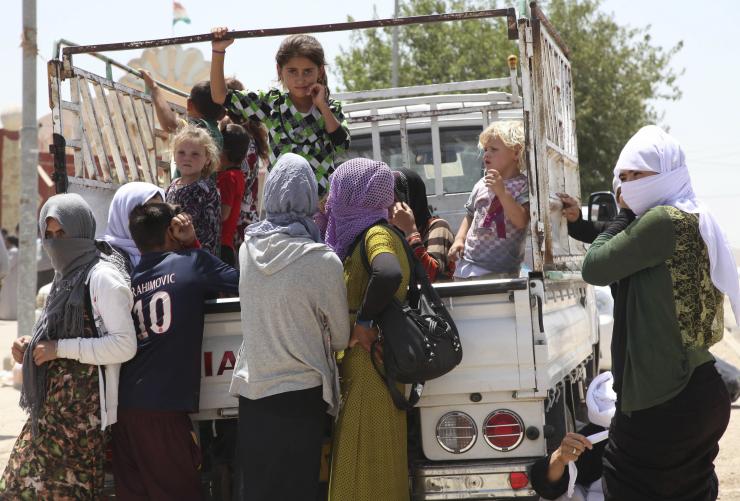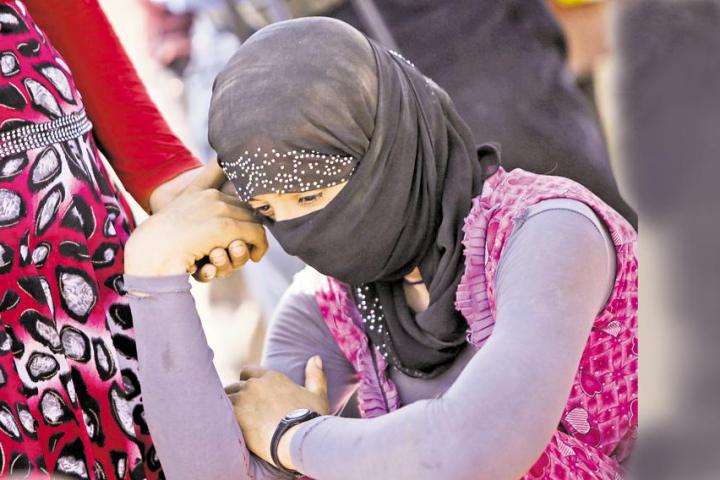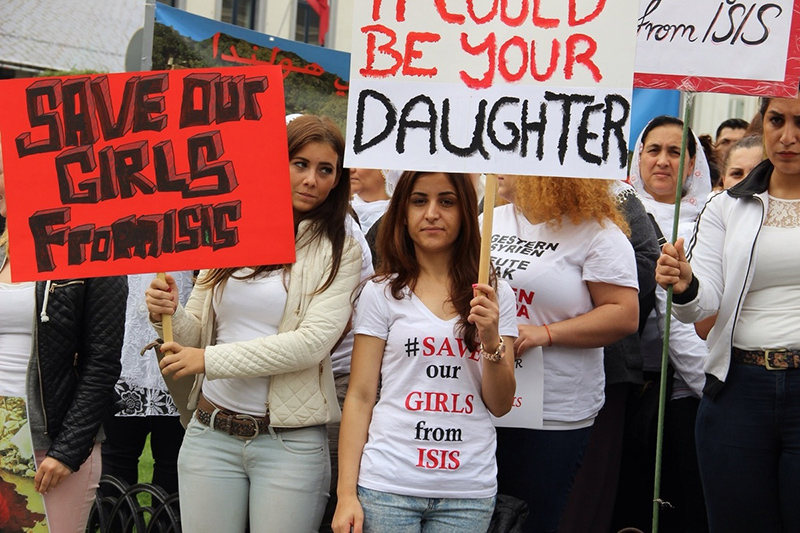
Reports from Iraq and Syria have claimed that the terror group known as ISIS has engaged in acts of "extreme" sexual violence against women, including putting them up on the auction block. The enslaved women have few escape options.
According to James Reinl of Middle East Eye, women who have escaped from the Islamic State's control have relayed harrowing stories of rape and other hideous acts of violence. The United Nations special representative on sexual violence in conflict, Zainab Bangura, heard many of these stories during a tour of refugee camps in the region.
"They are institutionalizing sexual violence," Bangura said of ISIS. "The brutalization of women and girls is central to their ideology. They use sexual violence as a 'tactic of terrorism' to advance key strategic priorities, such as recruitment, fundraising, to enforce discipline and order - through the punishment of dissenters or family members - and to advance their radical ideology."
Bangura told Reinl that she "struggled to understand the mentality of people who commit such crimes."
"They commit rape, sexual slavery, forced prostitution and other acts of extreme brutality," Bangura explained. "We heard one case of a 20-year-old girl who was burned alive because she refused to perform an extreme sex act. We learned of many other sadistic sexual acts."

Bangura elaborated on how the ISIS slave auctions worked. After the terror group occupied a village, they would execute all males 14 years and older before brutalizing the women.
"The women and mothers are separated," Bangura said. "Girls are stripped naked, tested for virginity and examined for breast size and prettiness. The youngest, and those considered the prettiest virgins fetch higher prices and are sent to Raqqa, the IS stronghold."
The U.N. special representative noted that sheikhs get first choice in the slave market, followed by emirs and fighters.
"They often take three or four girls each and keep them for a month or so, until they grow tired of a girl, when she goes back to market," Bangura said. "At slave auctions, buyers haggle fiercely, driving down prices by disparaging girls as flat-chested or unattractive. We heard about one girl who was traded 22 times, and another, who had escaped, told us that the sheikh who had captured her wrote his name on the back of her hand to show that she was his 'property.'"
Reinl asked whether or not all women under ISIS were enslaved. Bangura replied that while most of them were enslaved after ISIS attacked a village, some parents, particularly in the Iraqi city of Mosul, gave their daughters away to the terror group as part of an Islamic concept.
"To understand this, we must examine the concept of jihad al-nikah, or sexual jihad - whereby women's bodies are used as part of supporting the IS campaign," Bangura said. "There are tens of thousands of men who expect that they will 'get' women to 'marry.' A woman's contribution is to marry them and cater for them in many ways, including sexually. IS men may have a wife, as well as several slaves."
However, Bangura noted that some of the wives helped the slaves escape. There were other methods to help get the women out of sexual slavery too.
"Some are released when a ransom is paid," Bangura said. "When parents or community leaders are informed about the whereabouts of the women and girls, they would raise money - as much as $5,000 - and use an intermediary to 'buy' the girls back."
The U.N. special representative told Reinl that some enslaved women tried to take matters into their own hands, including death. Bangura noted that ISIS forced the women to remove their headscarves after some used the covering to try to die via hanging.
"I learned of three girls who tried to commit suicide by drinking rat poison, which had been left in a room," Bangura said. "They started vomiting and were rushed to hospital and washed out. When they came back, they were brutally attacked."
However, Bangura noted that many of the enslaved women came from the minority Yazidi community, which has shown a willingness to welcome back the victims through various coping mechanisms. She insisted that such victimized women would need "qualified and psycho-social support that is not readily available" in the region.
"They do get support from their families, communities and the government, but the needs are huge," Bangura said. "I met one woman who was in shock - most of her family had either been taken or killed. She was looking after her four-year-old son and trying to track down her 15-year-old daughter, who was taken by [ISIS]."

Bangura thought that besides military intervention led by the United States, more had to be done in the region to end the reign of terror imposed by ISIS.
"Information is its oxygen - we must suffocate them," Bangura said. "Their tactic is to destroy individuals, communities, laws and society and build a medieval social order. We also need to use economic divestments to halt IS sources of income and supply lines. We must also explain the scope of the atrocities being committed, and look at accountability."
Bangura added that the world "must understand their tactics and defeat them." Hearing the reports of brutalized women under ISIS control was "painful" for her.
"The countries I have worked on include Bosnia, Congo, South Sudan, Somalia and Central African Republic," she said. "I never saw anything like this. I cannot understand such inhumanity. I was sick, I couldn't understand."














